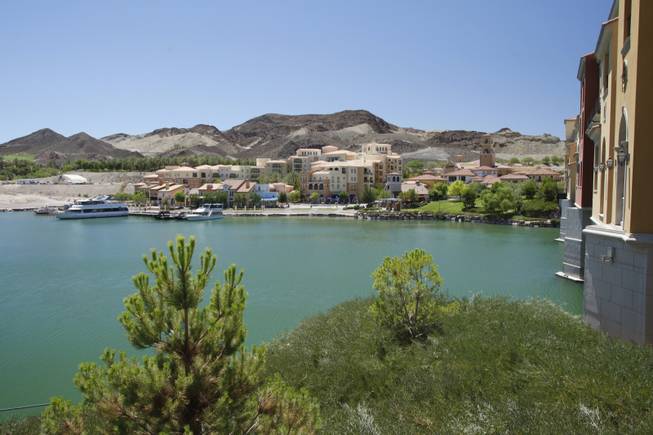Monday, Sept. 21, 2009 | 3:07 p.m.
Related Documents (.pdf)
Related stories
- Council briefed on Lake Las Vegas bankruptcy (9-15-2009)
- Lake Las Vegas proposes bankruptcy plan (9-5-2009)
- Lender sued over Lake Las Vegas loans (9-3-2009)
- Lenders to foreclose on Lake Las Vegas’ last golf course (6-29-2009)
- Judge approves bankruptcy for Lake Las Vegas golf course (6-29-2009)
- Another golf course to close at struggling Lake Las Vegas (6-25-2009)
- Lenders seek control of Lake Las Vegas hotel (6-4-2009)
- Residents of bankrupt Lake Las Vegas face uncertainty (3-23-2009)
- Lake Las Vegas can abandon golf course, judge says (1-15-2009)
- Amid the decline, decadence for the feet (1-5-2009)
- Judge: Lake Las Vegas golf course should be shuttered (12-22-2008)
- Resort golf course’s fate spurs debate (12-16-2008)
- Never spoil a good party with talk of a recession (8-29-2008)
- Bridge over troubled water (5-24-2008)
Map of Lake Las Vegas Resort
Disputes are heating up between the current and former owners of the Lake Las Vegas development as the project attempts to emerge from bankruptcy.
Attorneys for Lake Las Vegas, a group of creditors and a key lender filed court papers last week responding to a motion by the former owner, Transcontinental Properties Inc., that the massive bankruptcy case involving liabilities of $728 million be dismissed.
Transcontinental claims the bankruptcy case should be dismissed because it's a charade in which Credit Suisse Group AG is actually both the main creditor and main debtor.
In their Aug. 20 motion, attorneys for Santa Barbara, Calif.-based Transcontinental Properties Inc. and Transcontinental Corp. said Lake Las Vegas was "solidly solvent" through mid-2004 but that Credit Suisse later effectively took over Lake Las Vegas.
Transcontinental noted allegations that predatory-lending practices by Credit Suisse at Lake Las Vegas enabled Credit Suisse to take over the high-end golf course, resort and residential development in Henderson. Credit Suisse has denied the allegation of predatory lending.
Transcontinental said Credit Suisse loaned the development's owners $560 million in 2004.
A unique feature of the 2004 loan was that it refinanced $48 million in existing debt and allowed the Lake Las Vegas developers to earn a return on their hundreds of millions of dollars in equity investments, Transcontinental said.
But encumbered with more debt and facing a deteriorating economy, Transcontinental said Lake Las Vegas could not make a loan payment in September 2007 and Credit Suisse then took control of the project.
Since filing for bankruptcy in 2008, Lake Las Vegas has lost more than $65 million -- losses covered by Credit Suisse, Transcontinental complained.
"The debtors are kept alive solely by their senior lender, who also happens to be, for all practical purposes, the debtors themselves," Transcontinental argued in its motion. "Credit Suisse as the senior creditor could have achieved the same result for itself as the owner and these Chapter 11 cases were entirely unnecessary."
"These cases present the novel circumstance of a lender creating an entity to control the debtors to give it the sham appearance of independence," complained Transcontinental, which charged the bankruptcy case was really filed so Credit Suisse could resolve disputes between itself and other lenders.
The bankruptcy case has accumulated $6.5 million in professional fee expenses -- money that otherwise could have been used to pay the bills of unsecured creditors, Transcontinental complained.
Transcontinental said the bankruptcy cases also serve no purpose since there is no equity to reorganize -- it said the value of Lake at Las Vegas Joint Venture LLC's real estate is estimated at $147 million vs. the secured debt to Credit Suisse totaling more than $696 million. Bankruptcy could have been avoided if Credit Suisse had simply foreclosed on the property, Transcontinental's attorneys said.
But attorneys for Lake Las Vegas, Credit Suisse, Cayman Islands Branch and the case's Unsecured Creditors Committee fired back at Transcontinental last week, with Lake Las Vegas and the Unsecured Creditors questioning Transcontinental's motive in seeking dismissal of the case.
They said Transcontinental is actually hoping to block threatened post-bankruptcy litigation against the former owners of Lake Las Vegas.
Attorneys for Lake at Las Vegas Joint Venture LLC and its affiliates in the Chapter 11 cases said Transcontinental is acting not as an unsecured creditor, but as, or on behalf of, the defendant in a pending bankruptcy court lawsuit over infrastructure funding development disputes.
They said Transcontinental is also acting as a likely defendant "in certain anticipated post-confirmation litigation against the debtors' former insiders, including litigation to recover over $400 million in transfers from the debtors to the debtors' former equity holders."
"Transcontinental's goal in bringing the motion is not to make it easier for general unsecured creditors to obtain payment from the debtors. General unsecured creditors stand to receive absolutely nothing if the cases are dismissed," Lake at Las Vegas attorneys said. "Rather, Transcontinental's goal is obstructionist. Transcontinental seeks to make it as difficult for the debtors as possible to bring causes of action against Transcontinental and the debtors' other former equity holders and insiders.
"Transcontinental's real goal in seeking the dismissal of the cases is to force the debtors into a freefall liquidation, where the debtors will lack the ability to cover the costs of pursuing litigation and where the debtors will lose potential witnesses and documents that would otherwise be used in that litigation," Lake at Las Vegas said in its filing.
An Oct. 2 hearing is set on the motion by Transcontinental that the cases be dismissed. Lake at Las Vegas Joint Venture, in the meantime, is seeking approval during hearings Oct. 15 and Dec. 15 for its plan to emerge from bankruptcy.


Join the Discussion:
Check this out for a full explanation of our conversion to the LiveFyre commenting system and instructions on how to sign up for an account.
Full comments policy